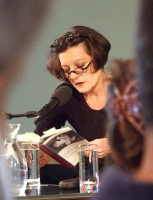| 出生地: | luó mǎ ní yà |
|
| |
生平介绍
赫塔·米勒出生于罗马尼亚蒂米什县尼茨基多尔夫乡,其父母都是罗马尼亚的施瓦本(德国裔)农民。她的父亲曾在二战中参加了德国党卫军。罗马尼亚共产党在1945年以后把她的母亲驱逐到了苏联的劳工营。1973年至1976年,米勒在蒂米什瓦拉西部大学专修德国研究与罗马尼亚文学。1976年,开始进入一家工程公司当翻译员,但1979年时因不愿与当时罗马尼亚共产党政权的秘密警察合作而被开除。此后曾以当幼教老师及经营德语私塾为生。当时在罗马尼亚,几乎所有作品都必须经审查删选后才能出版。1982年,她的第一本书《低地》也因批判现实而只能以删节版发表。
由于她多次对罗马尼亚政府提出批评,并且担心秘密警察的侵扰,1987年,米勒与她当时的丈夫、小说家理查德·瓦格纳离开罗马尼亚移居德国。之后,作为一位曾经生活在罗马尼亚的德国作家,她得到了一系列国内外大学讲学的机会。2005年,米勒成为柏林自由大学的客座教授,现居柏林。
2009年,通过罗伯特-博世基金会的奖学金资助,米勒的小说《呼吸秋千》获德国书籍奖提名,并入选最后的6本最佳小说。该小说描述了一个年轻人被流放到俄罗斯的旅程和生活,这也映射了二战后德国人在罗马尼亚特兰西瓦尼亚地区的命运。作为小说的原型,米勒曾采访并记录下奥斯卡-帕斯蒂尔的一些亲身经历。帕斯蒂尔是一名词作者,诗人,曾获布什耐文学奖,死于2006年。
作品
- 《低地》(德文:Niederungen),短篇故事集,米勒的处女作。1982年在布加勒斯特出版的版本受到罗马尼亚共产党政权的审查。1984年,未删减版本在德国发行。1999年,英文版以“Nadirs”为书名出版。
- 《暴虐的探戈》(德文:Drückender Tango),故事集,布加勒斯特,1984年。
- 《人是世上的大野鸡》Der Mensch ist ein großer Fasan auf der Welt,柏林,1986年。
- 《赤脚二月》Barfüßiger Februar 柏林,1987年。
- 《独腿旅行》 Reisende auf einem Bein,柏林,1989年。
- 《作为感知的自我重塑》Wie Wahrnehmung sich erfindet1990年。
- 《镜中恶魔》Der Teufel sitzt im Spiegel 柏林,1991年。
- 《狐狸那时已是猎人》Der Fuchs war damals schon der Jäger1992年。
- 《一颗热土豆是一张温暖的床》Eine warme Kartoffel ist ein warmes Bett 1992年。
- 《警卫的梳子》Der Wächter nimmt seinen Kamm,1993年。
- 《无法到达》Angekommen wie nicht da ,1994年。
- 《风中绿李》(另译为《心兽》)(德文:Herztier)。
- 《饥饿与丝绸》Hunger und Seide 散文集,1995年。
- 《在陷阱里》In der Falle ,1996年。
- 《今天我无法面对自己》 Heute wär ich mir lieber nicht begegnet1997年。
- 《在灯笼里奇怪地生活是个屁》Der fremde Blick oder das Leben ist ein Furz in der Laterne 1999年。
- 《活在发髻里的贵妇》Im Haarknoten wohnt eine Dame 诗歌2000年。
- 《家庭,说的是什么》Heimat ist das, was gesprochen wird Blieskastel,2001年。
- 《国王鞠躬,国王杀人》(德文:Der König verneigt sich und tötet),散文集,2003年。
- 《托着摩卡杯的苍白男人》(德文:Die blassen Herren mit den Mokkatassen)2005年。
- 《呼吸秋千》(德文:Atemschaukel)慕尼黑,2009年。
- 《克里斯蒂娜和她的假镜片或(不)在秘密机构的文件》(德文:Cristina und ihre Attrappe oder Was (nicht) in den Akten der Securitate steht)散文。哥廷根,2009年。
- 《不变的雪与不变的叔叔》(德文:Immer derselbe Schnee und immer derselbe Onkel)演讲。慕尼黑,2011年。
米勒作品已翻译成24种语言出版发行。
所获奖项
- 1981年 Adam-Müller-Guttenbrunn Sponsored Prize the Temeswar Literature Circle
- 1984年 阿斯贝克特文学奖
- 1985年 劳里斯文学奖
- 1985年 不莱梅文学鼓励奖
- 1987年 达姆施塔特里卡达-胡赫奖
- 1989年 Marieluise-Fleißer Prize of Ingolstadt
- 1989年 德国语言奖
- 1990年 罗斯维塔勋章
- 1991年 柯拉尼施泰内尔文学奖
- 1993年 批判文学奖
- 1994年 克莱斯特文学奖
- 1995年 亚里斯提奖
- 1995/96年 City-writer of Frankfurt-Bergen-Enkheim
- 1997年 格拉茨文学奖
- 1998年 Ida-Dehmel Literature Prize and the International IMPAC Dublin Literary Award for Herztier / The Land of Green Plums
- 1999年 弗兰茨-卡夫卡奖
- 2001年 CICERO Speaker Prize
- 2002年 莱茵兰-普法尔茨的卡尔-楚克迈尔奖章
- 2003年 约瑟夫-布赖特巴赫奖(与克里斯托弗·梅克尔和哈拉尔德·魏因里希分享)
- 2004年 康拉德-阿登纳基金会文学奖
- 2005年 柏林文学奖
- 2006年 维特欧洲文学奖、沃尔特-哈森克勒费尔文学奖
- 2009年 诺贝尔文学奖
- 2009年 弗朗兹-威弗尔人权奖
- 2010年 霍夫曼·冯·法勒斯雷奖
- 2011年 塞缪尔·博古米尔·林德奖
- 2011年 莫妮斯马尼亚奖
- 2012年 巴伐利亚·马克西米利科学艺术奖
- 2014年 谢汉内洛尔·格雷夫文学奖
注释
- ^ 2009年诺贝尔文学奖,Nobelprize.org.,2009年10月9日查阅。原文:“who, with the concentration of poetry and the frankness of prose, depicts the landscape of the dispossessed.”
- ^ 译名来源:荷塔·慕勒诗作中译/作品:503号,译者:贝岭,《联合副刊》。2009年10月23日。2009年10月25日查阅。
Herta Müller (German: [ˈhɛʁ.ta ˈmʏ.lɐ] (![]() listen); born 17 August 1953) is a Romanian-born German novelist, poet, essayist and recipient of the 2009 Nobel Prize in Literature. Born in Nițchidorf, Timiș County in Romania, her native language is German. Since the early 1990s, she has been internationally established, and her works have been translated into more than twenty languages.
listen); born 17 August 1953) is a Romanian-born German novelist, poet, essayist and recipient of the 2009 Nobel Prize in Literature. Born in Nițchidorf, Timiș County in Romania, her native language is German. Since the early 1990s, she has been internationally established, and her works have been translated into more than twenty languages.
Müller is noted for her works depicting the effects of violence, cruelty and terror, usually in the setting of the Socialist Republic of Romania under the repressive Nicolae Ceaușescu regime which she has experienced herself. Many of her works are told from the viewpoint of the German minority in Romania and are also a depiction of the modern history of the Germans in the Banat and Transylvania. Her much acclaimed 2009 novel The Hunger Angel (Atemschaukel) portrays the deportation of Romania's German minority to Soviet Gulags during the Soviet occupation of Romania for use as German forced labor.
Müller has received more than twenty awards to date, including the Kleist Prize (1994), the Aristeion Prize (1995), the International Dublin Literary Award (1998) and the Franz Werfel Human Rights Award (2009). On 8 October 2009, the Swedish Academy announced that she had been awarded the Nobel Prize in Literature, describing her as a woman "who, with the concentration of poetry and the frankness of prose, depicts the landscape of the dispossessed".
